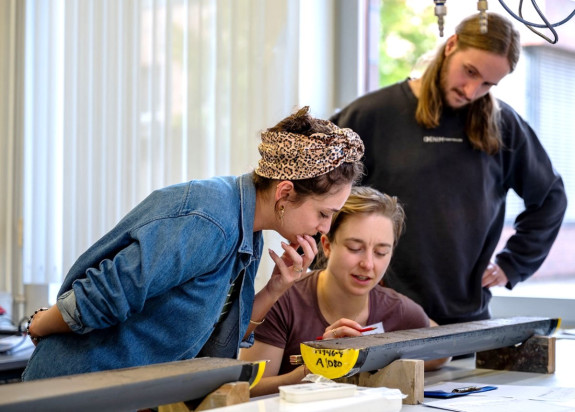Awards and Grants
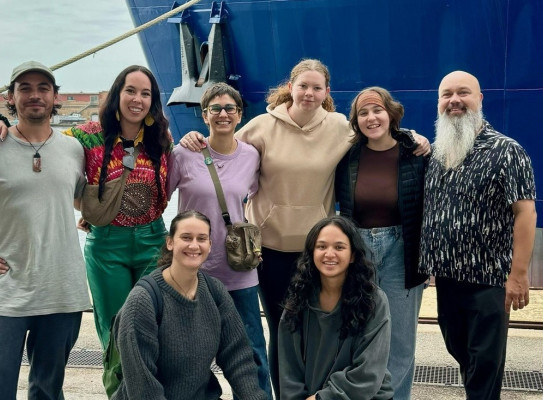
ANZIC Marine Geoscience Masterclass 2025
The Australian and New Zealand International Scientific Drilling Consortium (ANZIC) and GeoDiscoveryNZ supported last year’s Marine Geoscience Masterclass, which took place in Fiordland and Dunedin, 1-12 December. The 12-day immersive program introduced 24 of Australia and New Zealand’s brightest Earth Science students to hands-on fieldwork experience on the RV Polaris II in Doubtful Sound and cutting-edge laboratory analysis at the Otago Repository for Core Analysis (ORCA).
Led by colleagues at the University of Otago and supported by Greer Gilmer (ESNZ), this ANZIC Masterclass is a world-first course, blending ICDP and IODP science, directly supporting the Fjords as Archives of Climate and Environmental Transitions (FACET)(external link) initiative, an ICDP proposal to drill New Zealand’s fjord basins and unlock their secrets of carbon cycling and climate change. The Masterclass replicates both shipboard and onshore laboratory environments, equipping students with knowledge and skills for future involvement in ICDP and IODP research. We will also be supporting this Masterclass in 2026.
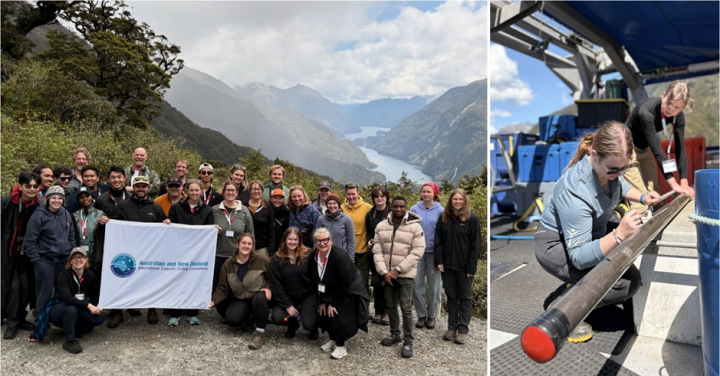
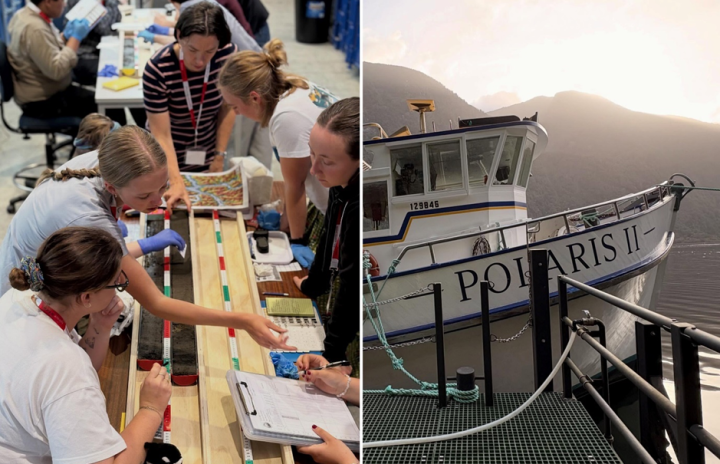
Investing in our future scientists
Each year, GeoDiscoveryNZ and ANZIC provide support for tertiary students from Aotearoa NZ to take part in international Summer Schools focused on ocean and continental scientific drilling research. These geoeducation programmes offer students valuable opportunities to deepen their knowledge, gain hands-on experience, and expand their academic networks.
By engaging directly with leading scientists and participating in real-world research contexts, students develop critical skills in data analysis, fieldwork techniques, and scientific communication. These initiatives not only strengthen their understanding of Earth systems but also inspire future careers in geoscience, environmental research, and resource management. Moreover, the collaborative and interdisciplinary nature of these programmes fosters innovation and builds lasting connections within the global geoscience community.
Over the past three months, we supported five students in attending three Summer Schools in Europe. Read about their experiences and impressions below.
Urbino Summer School in Paleoclimatology 2025, University of Urbino, Italy
23 July to 8 August 2025
GeoDiscoveryNZ supported my attendance at Urbino Summer School in Paleoclimatology in Italy in July 2025. The course was wide-ranging in the field of paleoclimatology, with a mixture of lectures, applications of material learnt, a conference day, and a field trip. This field trip was a highlight for me – seeing the KT boundary and a lovely cyclic stratigraphy sequence. We then learned to apply spectral analysis techniques to our field-collected data in subsequent sessions, something I had been wanting to learn.
Meeting and learning about the other students' and teachers' research areas was rewarding, as was sharing my own work. It was great to introduce others to my research on paleo-current reconstruction, and I look forward to seeing how everyone's work progresses and to cross paths again as colleagues in the future. The social aspects of the course were equally valuable, and experiencing Italy for the first time added to the experience. This course proved useful for situating my work within a broader palaeoclimatology context. The program also provided insights into paleoclimate methodologies and data interpretation, which were especially relevant to my interest in post-Pliocene climate records. Thanks again to ANZIC and GeoDiscoveryNZ for helping us attend this summer school.
Natalie-Jane Reid (University of Otago)
Lectures ranging from ice sheet modelling to detailed biomarkers analysis were held in Urbino over the three weeks of the Urbino Summer School in Paleoclimatology 2025. A field trip was also included, which was then used as an example of data collecting and analysis. Additionally, a conference day was held to give space to the participants to show their work.
Thanks to the support of ANZIC and GeoDiscoveryNZ, I was able to attend the school this year. It provided a good overview of ongoing research; the main knowledge gaps currently being addressed by the community and those that remain to be explored. And, perhaps more importantly for me at this stage, it also offered an excellent opportunity to meet new researchers whose work is closely related to mine and may connect even more in the future.
I had the great opportunity of speaking with experts in biomarkers and Antarctic research, who shared valuable insights on my project and research questions, which I’m sure will largely benefit from their contribution. Additionally, I was able to connect with researchers whose project area is close to mine, as well as others with similar projects in completely different environments but using the same methods, which led to very stimulating discussions.
Luisa Fontanot (University of Otago)
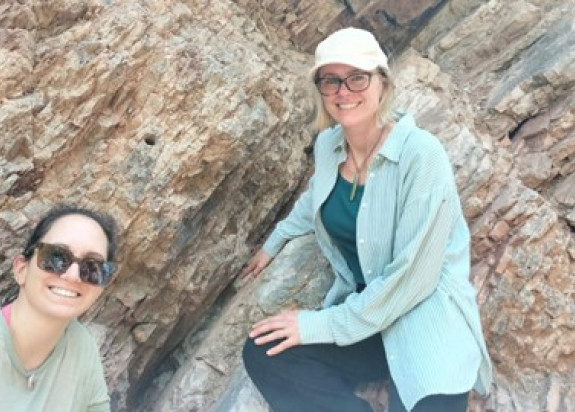
ECORD Summer School 2025: Downhole Logging for IODP Science, University of Leicester, UK
30 August to 5 September 2025
At the start of September, thanks to GeoDiscoveryNZ, I had the privilege of attending the 2025 ECORD Summer School on Marine Downhole Logging for Marine Geoscience, hosted at the University of Leicester. A variety of topics and workshops occurred during the seven-day summer school, providing insight into scientific offshore drilling and logging operations, petrophysics, downhole logging advantages, limitations and methods, as well as log processing and interpretation, among other things.
Among the many engaging interactive lectures, I particularly enjoyed Leo Barbosa’s on Mission Specific Platforms (MSPs), Jochem Kueck’s on International Continental Scientific Drilling Program (ICDP), and Jack Brickell’s on Hydrogeology. I was intrigued by the level of operational complexity required for marine drilling expeditions and the level of adaptability MSPs can provide. It was also exciting to hear about the similarities and differences between continental and offshore operations, as well as the fantastic scientific drilling training that the ICDP offers. Learning about hydrogeology from the perspective of the IODP3 Expedition 501 ‘New England Shelf hydrogeology’ was fascinating and reaffirmed that hydrology and water resourcing are research areas that I would love to become more involved in as my career progresses.
During the summer school, every participant had the opportunity to present a poster on their current research. The variety of poster topics was impressive and allowed connections to be made across disciplines that would be difficult to achieve at larger-scale conferences. A major highlight of the summer school for me was the opportunity to learn how to use the WellCAD software within workshops taught by specialists from the University of Montpellier, and ALT, the software developers. Learning how to use WellCAD for borehole log visualisation and processing will directly benefit my current Antarctic research, as I can now contribute to analysing the optical televiewer borehole imagery collected during our recent field season.
Attending this summer school was incredibly beneficial to my professional development. It helped bridge knowledge gaps between sediment geology and drilling operations, strengthened my technical skills, and expanded my understanding of the scientific drilling process from both engineering and geological perspectives. Most importantly, the connections I formed with the summer school organisers, lecturers, and early career researchers who attended were central to my enjoyment of the summer school. I look forward to reconnecting and collaborating in the future as well as applying the skills I gained to my own research.
Jessica MacFarquhar (University of Canterbury)
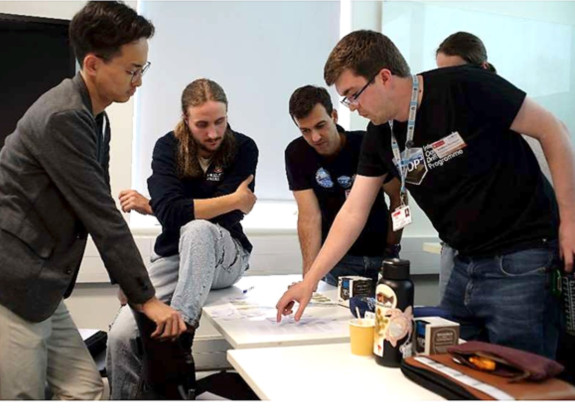
Thanks to the generous support of GeoDiscoveryNZ, I was fortunate enough to be able to attend the 9th edition of the ECORD Summer School on Downhole Logging for Marine Geoscience at the University of Leicester, UK. Over the span of 7 days, we listened to a variety of lectures and engaged in various activities that deeply familiarised our group with the methodologies and applications of downhole logging in the geosciences.
As a marine geologist set to sail next month as part of IODP Expedition 503 to the Japan Trench, I found the experience at the workshop invaluable, especially as my role aboard the Chikyu is to be a physical properties specialist. Getting the rundown on how ocean drilling operates from the people directly involved in the projects we learned about was an amazing opportunity and I have come away with a number of fresh ideas on how to deepen my future research through the use of these types of datasets. The school packed a lot into the brief period we were there, but it was wonderfully organised, and I have to commend the organisers for just how communal an experience they made the workshop. It was great to see the new connections and friendships made with other early career scientists from across the world. All in all, I highly recommend applying to attend the workshop for early career geoscientists with interests in the marine geosciences, especially those wanting to get involved with international ocean drilling projects.
Anthony Shorrock (University of Auckland)
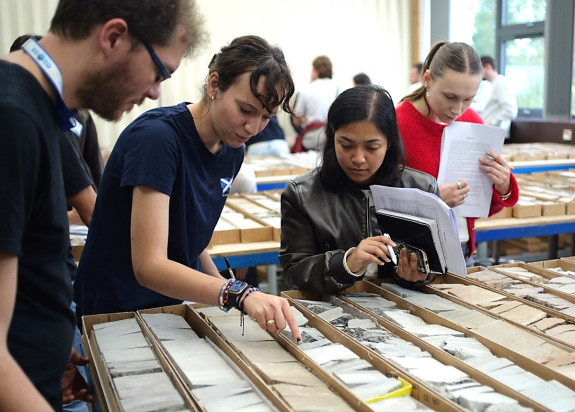
Bremen ECORD Summer School 2025, Southern Ocean – Antarctic paleoclimate interactions, MARUM, University of Bremen, Germany
8 to 19 September 2025
I recently attended the ECORD Summer School at the MARUM Marine Research Academy in Bremen, Germany. As an ANZIC participant, my travel costs were generously supported by GeoDiscoveryNZ, for which I would like to express my sincere thanks.
My main motivation for joining the course was to learn theory and practical skills for ocean drilling, as I will be participating for the first time in a marine voyage in November 2025. Having diverse interests across the earth and ocean sciences, I have pursued this opportunity to expand my horizons during this pivotal time of finishing my PhD at the University of Auckland.
The course had three main components: practical exercises, lectures, and presentations by participants. There was also structured time for networking with fellow participants and the lecturers, which was a great opportunity for further learning about each other’s work, interests, and goals for future research. We were also treated to a tour of the historical centre of Bremen, as well as a traditional German meal.
The practical exercises covered a multitude of methods which are typically used aboard drilling vessels and during onshore work following voyages. This included core description, physical properties (e.g., magnetic susceptibility and resistivity), pore water chemistry, computed tomography, biostratigraphy, borehole logging, and piecing together core transects. Having a chance to do hands-on work on real drill cores from around the world, together with new friends and future collaborators, tied together much of what we learned during the lectures, and was a learning highlight! I would now feel confident in my ability to strongly contribute as a member of various shipboard teams, with a based appreciation for the cross-team work and communication that is critical during large scientific voyages.
The lectures were given by more than thirty scientists from diverse fields and were thorough and detailed, and helped me develop a much deeper understanding of ocean circulation, especially in the Southern Ocean, and the transport and exchange of carbon, oxygen, nutrients, and heat via the Arctic Circumpolar Current. Having studied submarine volcanism during my PhD, the lectures, participant presentations, and conversations during the breaks sparked many questions about the complex interactions between marine and geological systems.
This summer school was a great experience, for which I am very grateful. New connections with researchers at various career stages across the fields of oceanography, marine geosciences, marine biology, and climate and environmental sciences, as well as the thematic exposure, have set the scene for exciting and strong multi-disciplinary collaboration as I embark on my post-PhD academic career.
Mila Huebsch (University of Auckland)
